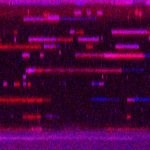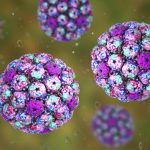 The chance that a person will develop cancer is determined by a mix of hard-wired genetic factors that are inherited and environmental changes that affect how genes are expressed. However, some of these environmental factors such as smoking or alcohol abuse are known to have “epigenetic” effects on genes that may also be inherited. Such epigenetic alterations don’t change the letters of the DNA code itself, but involve either placing or removing chemical tags on proteins that control whether these genes are turned on or off.
The chance that a person will develop cancer is determined by a mix of hard-wired genetic factors that are inherited and environmental changes that affect how genes are expressed. However, some of these environmental factors such as smoking or alcohol abuse are known to have “epigenetic” effects on genes that may also be inherited. Such epigenetic alterations don’t change the letters of the DNA code itself, but involve either placing or removing chemical tags on proteins that control whether these genes are turned on or off.
Since alcohol use disorder is known to increase the risk of cancer, Dr. Shirley Hill, professor of psychiatry at the University of Pittsburgh School of Medicine, wondered whether this increase in risk could be passed on to subsequent generations by an epigenetic change in cancer-causing genes.
Her recent findings, published in the journal Epigenomics, provide some preliminary evidence to suggest that this may indeed be the case.
“Establishing a connection between epigenetic changes and the risk of developing cancer is not easy,” Hill said. “It requires an in-depth history of alcohol use not only in study participants, but also their relatives across multiple generations. It also requires data to be collected on mothers’ alcohol use during pregnancy as this can help rule out any direct effects of alcohol on the fetus during pregnancy.”
Hill and her team had this exact information, along with DNA samples, as part of a long-running study on the psychiatric impacts of multi-generational alcohol use disorder in families.
“Because we had the foresight to store DNA for third generation offspring when they were still children, we could be fairly confident that any epigenetic changes we observed would have been inherited from either the parents or grandparents,” she said. “It was a one of a kind opportunity, and we had to take advantage of that.”
The researchers analyzed DNA from 62 first and second-generation individuals and 441 third-generation offspring, looking for the presence or absence of a chemical “methyl” tag on two genes – HRAS, an “oncogene” known to promote tumor growth, and TP53, a “tumor-suppressor” gene that as the name suggests, plays a role in inhibiting the growth of cancer cells.
Their analysis showed that having a parent or grandparent with alcohol dependence was associated with increased levels of the chemical tag (methylation) on the TP53 gene, which in turn could lead to lower levels of the tumor protective protein.The opposite effect was seen with HRAS, where alcohol dependence was associated with a decrease in methylation. Mothers diagnosed with alcohol use disorder were more likely to have offspring with reduced HRAS methylation levels. In both cases, the methylation effects seemed to be compounded with each generation affected by alcohol use.
 The findings don’t yet definitively show an increase in cancer incidence, Hill cautioned, noting that future work in her lab aims to address that aspect. By contacting the parents and grandparents in the families who would now be at higher risk for cancers due to their age, Hill and her team hope to link cancer occurrence with gene methylation status in their DNA that they collected and stored about 20 years ago.
The findings don’t yet definitively show an increase in cancer incidence, Hill cautioned, noting that future work in her lab aims to address that aspect. By contacting the parents and grandparents in the families who would now be at higher risk for cancers due to their age, Hill and her team hope to link cancer occurrence with gene methylation status in their DNA that they collected and stored about 20 years ago.
The researchers hope the findings will spark interest from foundations that might provide financial support for the new work, which could then pave the way for federally-funded translational research. Eventually, they noted, methylation status could be developed as a screening tool that could lead to prevention efforts through use of agents that modify methylation status.
“The continued participation and cooperation from these families has allowed us to understand the effects of intergenerational transmission of alcohol use disorders and related substances use disorders,” Hill said. “We owe them a debt of gratitude, and hope that continued research in this field will eventually lead to further insights and impactful public health policies.”
The study was funded by National Institute on Alcohol Abuse and Alcoholism grants AA018289, AA005909, AA008082, AA015168 and AA021746.







